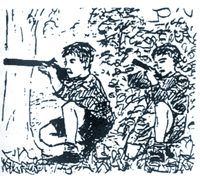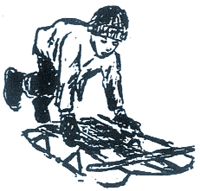The Known World

Awbury Park and Beyond
We lived near an arboretum. That's the kind of place where trees and shrubs are lain out by architects and the public can call it their own. That might be so but if someone digs up the irises or the daffodils or the Mountain Laurel or the Azaleas or goes up there for a Christmas tree, he'll soon be before the dock. In the summertime people would picnic there. It was a quiet retreat behind a low stone wall and the lawns — quite extensive — were always manicured by an army of gardeners who worked for the city at a time when work was part of the job. There were foot-paths in our arboretum and a winding tree-lined road that could take automobiles from the western end to the northeast side. Winter snows invited scores of sledders and a crowd of skaters would fill the largest of the three ponds and they performed merry exhibitions of their sport. And when the ice melted, goldfish and frogs and dragonflies took back possession of the water.

It was at the arboretum that we were introduced to moss and algae and ferns: things not found in our yards. To us, who were small, the arboretum was nature's realm as we imagined it always was even though it was a contrived place: thinned here, dense there and all by design. Great willow trees draped their fingers over the ponds, and away from the water the conifers insured winterscape wouldn't be so dull when other trees went bare.
Couples went there to walk on sunny afternoons or to sit under willows and ash and beech, umbrellas of shade. At night some might return for more private cuddling in this public place. Little boys would be at the ponds edges to spy on frogs and fish, to skip stones over the water and count the bounces. What a miracle.
Little boys, and medium sized ones, would roll down hills of grass — a senseless exercise. But then, dogs chase sticks, don't they? The lawns were placed there so boys could wrestle, the bushes so they could play hide-and-seek, the trees so they could climb. At night they would come over and catch lightning bugs, watch bats in scary flight and listen to owls, and accidently annoy lovers who hit the grass too early. When the boys got older they would bring over a bottle of beer, drink it and get a little dizzy and throw-up. Corn silk and Johnny smokers would be replaced by a cigarette or a cigar and it would be passed around like the indians used to do. It was all naughty and secret.
My sister and I went to the arboretum with our parents when we were small. That was an outing. We would play. We would explore the water's edge. We would pick violets and buttercups for mom. We'd have a snack at the picnic blanket, and could save a little for the ducks and the gold fish and the bees.
My second grade class went there for field trips. The teacher babbled on about things that were of interest to her. We tolerated that because not to meant disciplinary stuff and a hint, if we were bad, of no more days away from desk and inkwell.
Once we could cross streets on our own the visits to the park were independent forays.
There was another place not so far away. I could see a little of it from my bedroom window beyond those houses in back of ours. We called it "the lots." Once there was a big house there but it was demolished before I was allowed to step off the curb. Later in life a distant relative told me that relatives of theirs had lived there. I thought that these people were related to me as well. The fantasy made a more romantic impression than it was worth. "The lots" erstwhile the McDowell estate sat in earlier times next to the Ross mansion, torn down before I was born by Presbyterians who built a church in its place. Ross' son was kidnapped in 1874. A ransom was demanded by his abductors. Money was paid, but the child was never returned and for years it was regarded in fear as one of the great unsolved mysteries — when that sort of aberrant deed was not so common. When we were kids an occasional claimant still came forward announcing himself as the long lost Charlie Ross, like an American Anastasia looking for the inheritance. None passed the test and the estate is long dissolved. It's a safe bet that Charlie is long gone.
"The lots," once a civilized place manicured as nicely as its neighbors and the arboretum was grown wild. That was a bonus for kids who could explore among the lilac and the ivy, climb the maples and the poplars and the giant beech. It was an Eden, full of fruit: black cherries, mulberries, seckel pears, apples, scallions and rhubarb. On the down side was the other ivy: poison ivy. Those vulnerable to its itchy infection would seek relief with Fels Naphtha, soap that was more a malleable carborundum. That's the stuff to wash grease from work clothes or blood from the scene of the crime. When boys swore, mothers never washed mouths with Fels Naphtha but with Ivory or Camay.
Here was a kingdom. Parents might be seen at the arboretum. Other adults always seemed to be there. A Park Guard was assigned and seen on his patrol. At night a police cruiser dropped by to chase out beer drinkers and lovers with equal indifference. Two cops were in the car. One drove. The other manned the spot light. Keen eyes surveyed the ground and at a click offenders would be bathed in light and beat a retreat from the park. If they were smart they would have gone to our kingdom: "the lots." But no one went there except kids who ate cherries and seckel pears, who climbed trees and built forts and caught poison ivy.
Maybe a long time ago a couple wrestled around in the poison ivy while making love. Word got around I suppose and the lots were forevermore scratched from the list of places to make love.
Kids weren't privy to conversations of that sort.
Mothers give warning to their children not to take candy from strangers thanks to the guys who snatched Charlie Ross. Kids might have difficulty weighing advice against the promise of rewards. They're learning to gamble and the influence of the home will have to compete with "nice-people" who are possessive. It's got to be a puzzle for parents.
